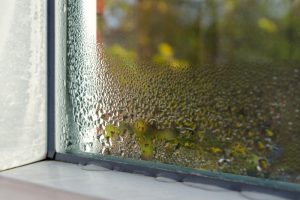
Humidity, the amount of water moisture in the air, is a well-known enemy of summer comfort. When relative humidity is high (above 60%), it makes it harder for the human body to release heat through perspiration. With more heat trapped in the body, temperatures feel hotter. An 80°F summer day can feel like it’s 90°F. That’s the power that humidity can have over your comfort.
High humidity can create other troubles in a home. All that moisture makes it easier for mold and mildew to grow, leading to a combination of building damage and nasty allergy triggers. Moisture isn’t good for electronics in a home either.
At this point, you might say, “Isn’t my AC taking care of the humidity? After all, it makes the house cooler.” There’s a story to that, as we’ll explain. We’re not only pros when it comes to air conditioning, we also work with dehumidifiers in Maysville, KY, and we can give you the lowdown on your AC and humidity. To understand this better, check out how humidity and your AC interact in Georgia’s muggy summers.
An AC has dehumidifying properties…
An air conditioning system cools the air through a process of evaporating cold refrigerant inside a coil located in a house. As the cold refrigerant evaporates, it absorbs heat from the air, cooling it. The refrigerant then travels to an outdoor coil, where it condenses and releases the heat outside. This is known as heat exchange—your AC moves heat from your house and exhausts it outdoors.
As part of evaporation, an AC also draws moisture from the air. You see this phenomenon all the time: a glass of cold liquid taken out of a refrigerator on a hot day will start to collect moisture beads along the outside. This is the water vapor in the air—the humidity—condensing.
The same occurs on the indoor coil of an AC. As it draws heat from the air, it also causes moisture to evaporate on the coil, where it is then removed through a condensate drainage system. So an AC has dehumidifying properties, taking some moisture out of a home’s air.
…but an AC is not a dehumidifier
Unless an air conditioner is built with a dedicated dehumidifier installed, it doesn’t have enough power to really dehumidifier the air. It’s only removing moisture as a side-effect of how it runs. If your house is dealing with uncomfortable levels of humidity, the AC won’t do much. It will make the house cooler, but the humidity will still linger, making you feel hotter. For more on the limitations of cooling alone, consider whether your AC can truly handle indoor humidity without extra support.
Meet the whole-house dehumidifier
If humidity is a major concern for your home comfort, there are several possibilities to investigate:s leaking ductwork, loss of refrigerant in the AC, or an air conditioner that’s failing.
If there aren’t any troubles like this, then the best step is to have our team install a whole-house dehumidifier. This device integrates into the HVAC system to work in tandem with the air conditioner. Using a special control, you can manipulate humidity levels the way you manipulate the temperature. (Although don’t go too dry, which creates its own set of problems. We recommend a relative humidity level of 45%.) If persistent humidity is plaguing your home, it may help to explore how excess humidity affects comfort and wellness.
If you want to learn more about beating humidity in your home, reach out to our team.

